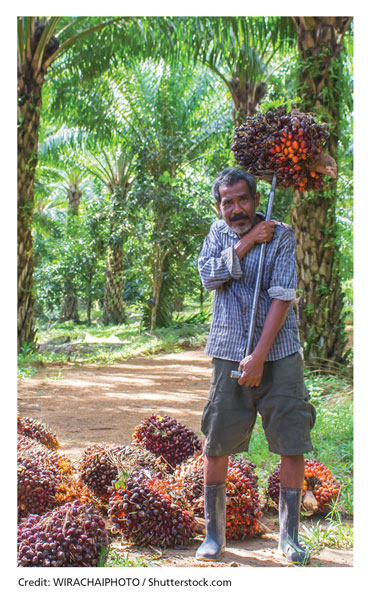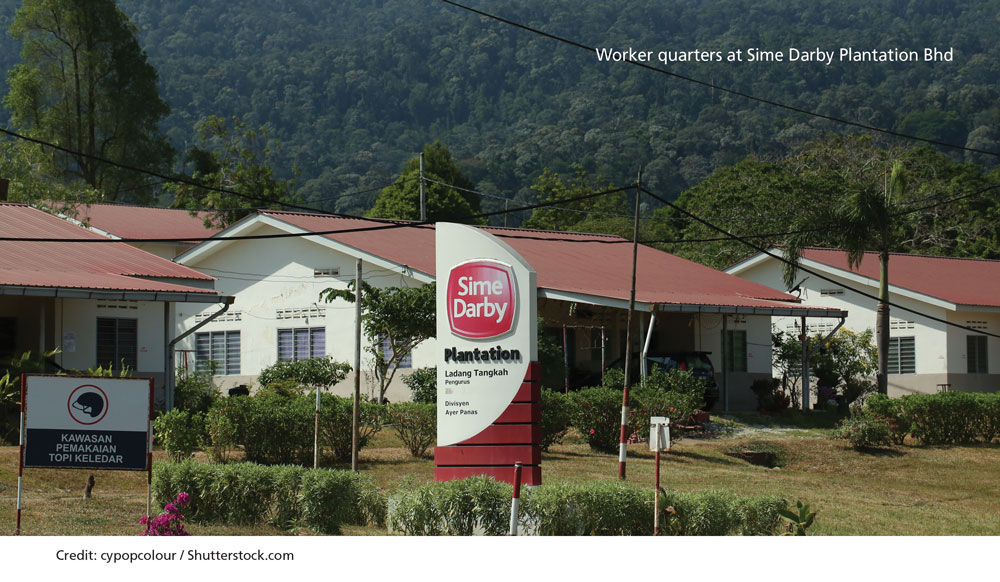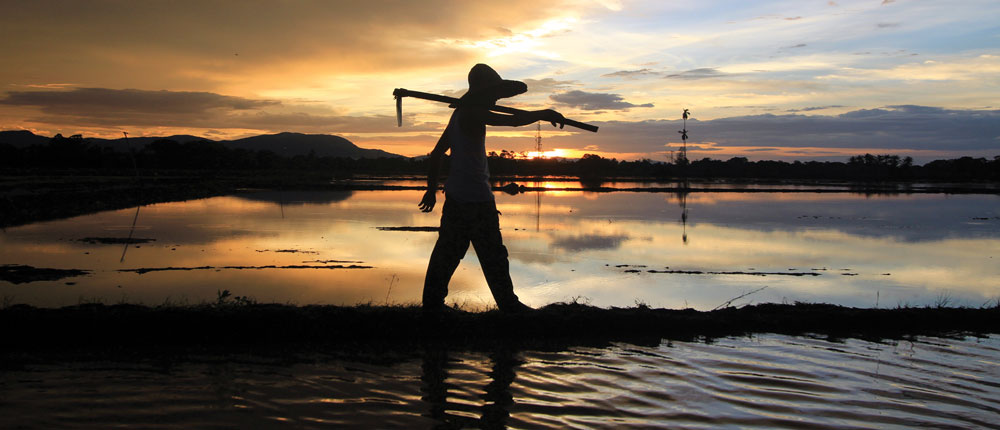



The European Commission (EC) is preparing a new regulation to target products produced with links to forced labour. It will give the EU the power to introduce trade bans, cut off financing and apply other sanctions to those suspected of benefitting (even indirectly) from forced labour.
This is additional to current EU proposals – the Environmental Due Diligence rules published as part of the Deforestation Regulation; and the Corporate Sustainability Due Diligence Directive.
The new regulation will be more aggressive and targeted at importing companies. It signals that they could face sanctions on labour or human rights related issues. However, it also strikes a fair balance between the need to eradicate forced and child labour – and the need to establish a fair legal framework that respects natural justice. Other EU institutions should support this position.
Companies and other stakeholders must have a channel for engagement before sanctions are applied: this is how real and substantive changes can be made. Taking an adversarial approach by treating the private sector as guilty by default, will not help. Practical solutions are needed; not grandstanding. The EC’s proposal broadly achieves this.
There is no perfect labour market, without risk of forced labour, either inside the EU or outside. The proposed regulation should therefore not be used as a trade barrier against exporting countries or targeted at commodities for political purposes.
The Malaysian palm oil sector recognises the need for continuous improvement, including identifying areas of potential weakness, and also enhancing monitoring and enforcement. The sector is cooperating with government entities, the International Labour Organisation (ILO), NGOs and others in this process. The EU should seek to become a cooperative partner in this process, and not produce a regulation that creates conflict instead of cooperation.
Key facts and data
Malaysian palm oil sector
In Malaysia millions of small farmers, and plantation employees work daily to collect, transport and process palm fruits. This has provided income, security and the hope of a brighter future for many in Malaysia, and elsewhere via remittances.
However, the sector is not perfect and we recognise this. Widespread claims of poor labour practices have been levelled by the US government and other parties. Some claims are grounded in facts; others are inaccurate. The labour situation in the sector is highly challenging; the palm oil supply chain is complex; unfortunately, at times, this has been open to exploitation by bad actors.
Migrant labour is a common feature of agricultural systems the world over. Whether in Europe, the US or in Malaysia, the need for labourers – who have economic and social needs – is a challenge for industries and governments.
Oil palm plantations in Malaysia are no different. They require a large labour force, due to the high productivity and high production levels of the crop. As a small, rapidly developing country, Malaysia’s domestic labour force cannot meet these needs. Migrant labour is therefore an important element for plantation companies and – especially – for the 300,000 small farmers who require assistance to work their land.

Strong governance and compliance protocols
The Malaysian palm oil sector is governed by a modern and strong regulatory framework:
Commitment to labour rights improvements
The Malaysian palm oil community understands that it must live up to global labour rights standards, if it is to continue to successfully serve customers in the Asia Pacific, India, Europe, US and Middle East, among other international markets.
This means that questions about labour rights raised by any government, must be considered as global questions. They resonate across the supply chain. The customers are global companies, with high labour rights standards that apply to all markets.
The Malaysian palm oil sector is determined to live up to this responsibility. It has in recent months instituted a series of commitments and action plans implemented by private growers and palm oil companies. These actions send a clear message to customers, governments and stakeholders that the private sector is committed to rectifying problems that exist.
Commitments implemented by the government and private sector:
The Charter affirms the commitment of members to respect labour rights, adopt responsible recruitment practices and provide good working and living conditions for workers. It commits all members to a binding set of commitments on labour rights, including:
The commitments in the Charter are based on several international guidelines and frameworks:
A key consideration must be whether issues are systemic, whether reforms are underway and ILO protocols are implemented, and whether national laws and industry policies include labour rights commitments. In Malaysia’s case, it is clear those commitments are in place.
Increasing standards and compliance protocols
The MPOCC has undertaken significant revisions to the MSPO standards; these were published at the beginning of 2022.
The standards revision process included a broader range of stakeholders than when the original standards were drafted. They included the Malaysian Trade Union Congress and the National Union of Plantation Workers. Their representation was vital to the process, and is in line with international norms on labour rights and representation, specifically a tripartite (government, union and employer) approach.
MSPO certification is mandatory for palm oil production in Malaysia. This is enforced via the criterion for organisations to be licensed under the Malaysian Palm Oil Board (MPOB), the national regulator. The revised MSPO requirements are designed to align with ILO norms on labour rights.
Importantly, the MSPO provides almost no exceptions for any participants in the supply chain, upstream or downstream. The only exception provided is for independent smallholders, i.e. those not part of an arrangement with a larger plantation company.
This is in line with the social and employment norms that are part of broader standards, such as Social Accountability standards.

Setting the record straight
Malaysia has been subject to misinformation on labour issues. It is important to correct these inaccuracies.
Multiple US government agencies have publicly released assessments, including criticism, of the labour situation related to Malaysia’s palm oil sector. These assessments are based on a variety of qualitative and quantitative sources. The sources themselves, and the data and evidence they present, deserve significant scrutiny.
Decisions are made based on these sources and their data, which affect millions of workers, as well as cost companies millions of dollars. The US government in general is transparent about much of its source material, which allows an independent assessment to be made.
The Malaysian Palm Oil Council (MPOC) has undertaken a close assessment of a number of the source materials cited by the US Department of Labour, US Department of State and the US Department of Homeland Security’s Customs & Border Protection.
This assessment of the materials reveals that much of the data provided by sources such as NGOs or petitioner organisations, are out-of-date (in some cases by almost 40 years) or are not applicable to the specific complexities of the Malaysian palm oil sector.
The US Department of Labour’s assessment of the palm oil sector relies on significantly outdated sources and datasets, and fails to take into account initiatives undertaken by the private sector in terms of preventative action.
The US State Department’s assessment similarly fails to acknowledge the work undertaken by the private sector to establish better practices and NGO collaboration, where government policies have not kept up to date with global benchmarks.
The presence of child labour in Malaysian oil palm plantations has been confirmed by the government; yet the incidence is relatively small, largely isolated to the states of Sabah and Sarawak. For the most part, it involves unpaid family members assisting parents and children in legal employment exposed to suboptimal conditions; there is no evidence of widespread or systematic or institutional forced labour of children.
The claims ignore two things:
Many of the claims against the industry regard unethical recruitment of workers – the industry has taken steps against this and is continuing to seek workable solutions.
There is a significant conflation of Indonesia and Malaysia in many of the source documents and data, which betrays a lack of understanding of the significant differences between the countries themselves, and their palm oil sectors.
Child labour appears to have greater weight than migrant labour. This is in line with both emotive campaign tactics and the priorities of government policies around the world in attempting to eradicate child labour (but does not align with the focus on Malaysia, where there is no evidence of widespread forced child labour).
There is reliance in several instances on reports by campaigning organisations that are explicitly opposed to palm oil cultivation in the region. Using such reports as source documentation is not serious public policy, given the pre-existing bias. This approach weakens the claim that actions taken are independent and evidence-based, and undermines the goal of rooting out forced labour.
It is apparent that many NGO reports used as ‘evidence’ in building a case against Malaysia are largely based on recycled claims or claims that are relevant to the palm oil industry across ASEAN, or different industry sectors in Malaysia.
Only 10 of the reports – spanning more than a decade – used informant interviews. The use of informants is common, but when reports are based on old claims and recycled information, the use of informants is not serious.
The bulk of the reports simply repeated claims from other sources. While this is not a suggestion that these non-primary reports are not credible, there are instances where reports that would be considered ‘high profile’ – such as those by Liberty Shared and EIA – are closer to advocacy documents rather than investigative or analytical documents.
MPOC
